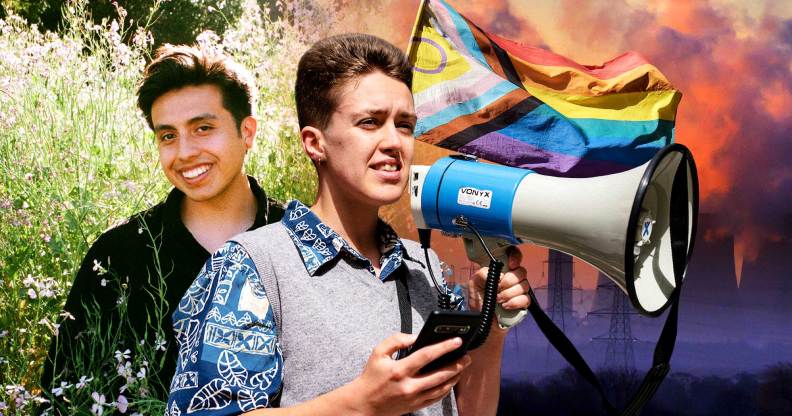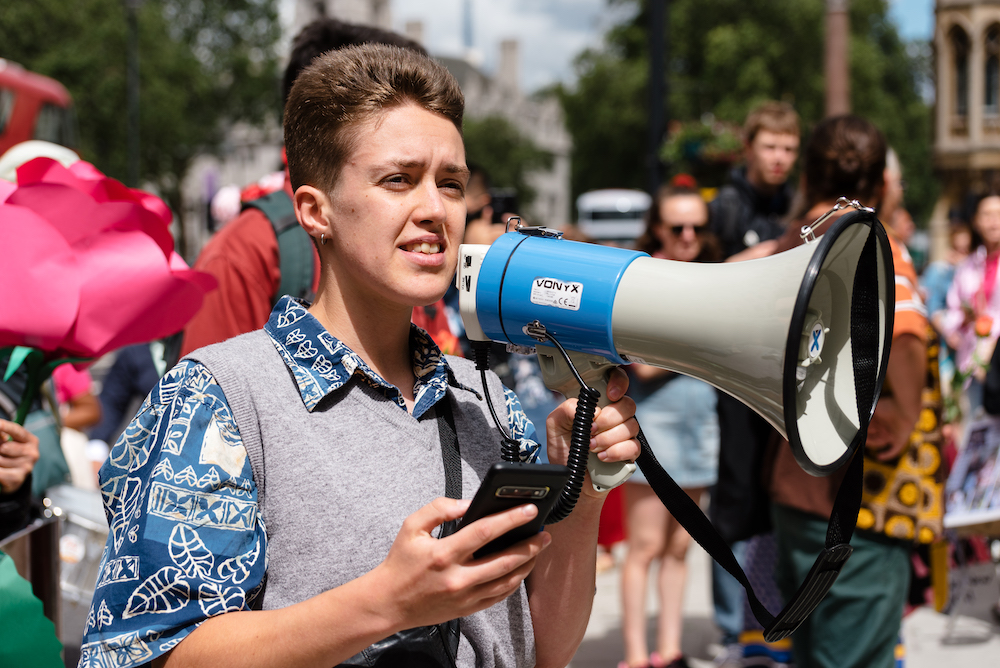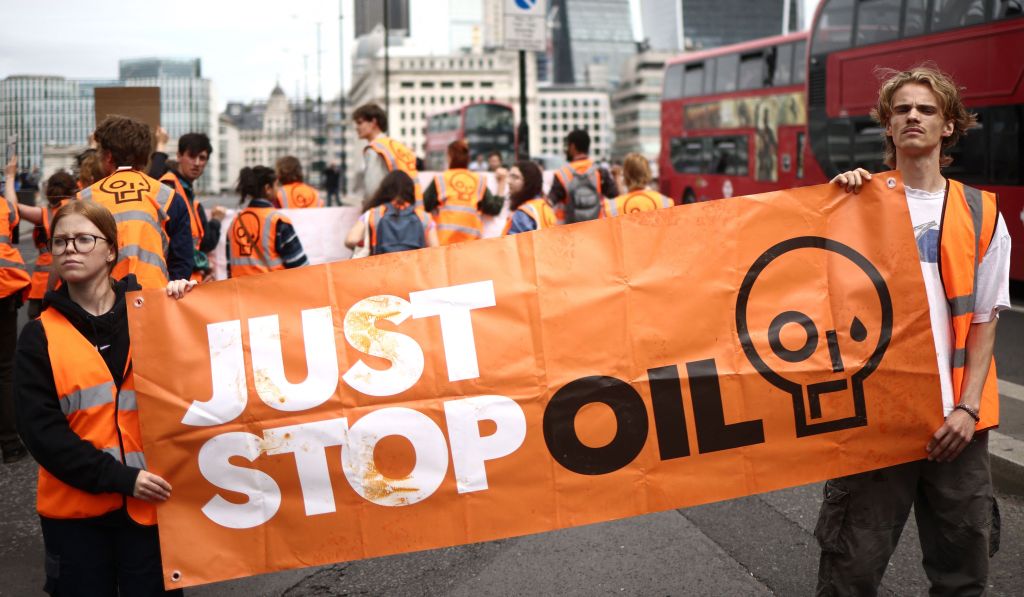Queer environmental activists warn of LGBTQ+ people ‘suffering first’ from catastrophic climate change

Eddy Quekett and Isaias Hernandez are LGBTQ+ climate change activists. (Credit: Getty Images / Andrea Domeniconi / Mariah Berdiago)
Eddy Quekett and Isaias Hernandez are LGBTQ+ climate change activists. (Credit: Getty Images / Andrea Domeniconi / Mariah Berdiago)
With wildfires burning in Hawaii, Antarctic ice levels at record lows and the UN claiming the world is entering a “global boiling” era, there’s no denying that the climate crisis is rapidly becoming a more terrifying prospect for us all.
The Earth’s changing climate affects everyone, but an underestimated knock-on effect is the impact it will have on the most vulnerable, including people of colour, disabled people, those in developing countries and the LGBTQ+ community.
Queer climate activists warn that the crisis may disproportionately impact the LGBTQ+ community, and stress that it is essential to focus on marginalised voices when speaking about climate change.
Eddy Quekett, a queer climate justice activist, has been campaigning for Fossil Free Pride in Leeds and has been involved in the #StopRosebank and Axe Drax campaigns, which are focused on fighting what they see as “new and existing climate-wrecking projects” in the UK.
“The climate crisis will disproportionately impact those who have been made most vulnerable by the systemic injustices in our society, and that includes the LGBTQ+ community,” Quekett told PinkNews.
“These injustices manifest in factors such as lack of access to safe and affordable housing, healthcare and employment – all of which are exacerbated by extreme weather events – displacement and food and water insecurity that result from climate breakdown.”

Quekett added that members of the LGBTQ+ community, particularly trans people, are “more likely to be unhoused, or to live in areas of deprivation where housing is less suited [to] extreme weather conditions [or which are] disproportionately exposed to air and water pollution”.
Homelessness, poverty and discrimination can be compounded by extreme weather events, and limit people’s access to resources such as air-conditioning and flood insurance, while climate change could adversely affect food prices too, Quekett said.
These issues are more prevalent within queer communities, with research into the ‘LGBTQ+ pay gap’ previously finding queer people are paid, on average, 16 per cent less than their straight peers, while other studies revealed that LGBTQ+ youth are 120 per cent more likely to experience homelessness than their cisgender, heterosexual counterparts.
This discrimination can also affect a person’s ability to cope during disastrous events. After Hurricane Katrina hit New Orleans in 2005, The Washington Blade reported that trans people faced discrimination in emergency shelters, while activists claimed LGBTQ+ organisations were forced to go to “extraordinary” lengths to ensure those living with HIV had access to their vital medication in the aftermath.
“During Hurricane Maria in Puerto Rico [six years ago], queer and trans communities lost access to medical necessities such as psychiatric medicines and hormones, and many faced heightened discrimination and violence,” Quekett claimed.
LGBTQ+ activists combatting climate change
While this sounds scary, LGBTQ+ activists have been at the forefront of the fight against the growing threat of climate change.
In July, several queer members of Just Stop Oil disrupted Pride in London, to protest against “polluters” sponsoring the event.
A group of LGBTQ+ supporters of the climate activism group wrote in a statement that “Pride was born from protest … high-polluting industries” should not be sponsoring Pride events.
“It is queer people, and particularly queer people of colour in the global south, who are suffering first in this accelerating social breakdown,” the statement added.

In 2017, activists in Washington DC disrupted Capital Pride to protest against the event’s sponsors, including financial services company Wells Fargo, which helped fund the Dakota Access (oil) Pipeline, which has been opposed by Native American communities.
Quekett pointed out that Fossil Free Pride recently succeeded in getting the British LGBT Awards to drop Shell and BP as sponsors, with 13 other Pride events agreeing to refuse sponsorship from fossil fuel companies and funders.
The activist said that the climate crisis is the “direct result of exploiting not just this planet, but all beings, peoples and cultures on it”, and the “injustice” underpinning the climate crisis means marginalised voices are critical in fighting it.
“To tackle climate breakdown, it is essential that we centre the voices of those made most vulnerable by systemic oppression, the voices of those who have felt the presence of those systems most strongly within their lives and are therefore best-informed on how we can dismantle them.”
Isaias Hernandez, the creator of environmental platform Queer Brown Vegan, said he uses social media to educate followers about the climate crisis, claiming that 25 per cent of people in the US learn about climate change through that medium.
According to Hernandez, tackling the climate crisis is “part of LGBTQ+ liberation”, and efforts to improve the situation must involve creating a “just” system for marginalised people.
“The idea of ‘queering’ a system doesn’t just come from putting a rainbow on it, it’s actually putting justice on it,” he told PinkNews.
“That means challenging the ways in which heteronormativity in our world – indoctrinated in many individuals – is constraining these ideologies.”

Hernandez urged LGBTQ+ people to focus on tackling climate change for the benefit of the global community, highlighting that queer liberation “cannot be built in one country”, with many current climate migrants “composed of queer and trans people”.
He went on to say: “That means actually acknowledging there is an issue within our system, and providing resources for our communities to talk about it.”
Quekett advised LGBTQ+ people worried about the climate crisis, that there’s “no one-size-fits-all” approach to helping, but charities such as Greenpeace agree that pushing for large, systemic changes can be the most effective action.
“It’s not all about protests, there is so much work that goes on behind the scenes, but admittedly the placard-and-megaphone combo has always been a personal favourite,” they said. “In times of crisis, collective care and community is absolutely vital, especially for marginalised individuals.
“If you want to get involved with the climate movement, identify the things you care about, the skills that you have, and find the people in your community you want to take action with, because a movement of communities who care for, and work in solidarity with, one another, will always be more powerful than one big group that tries to solve everything.”

